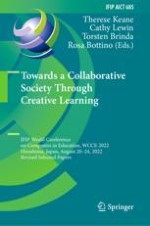2023 | OriginalPaper | Chapter
What Students Can Learn About Artificial Intelligence – Recommendations for K-12 Computing Education
Authors : Tilman Michaeli, Ralf Romeike, Stefan Seegerer
Published in: Towards a Collaborative Society Through Creative Learning
Publisher: Springer Nature Switzerland
Activate our intelligent search to find suitable subject content or patents.
Select sections of text to find matching patents with Artificial Intelligence. powered by
Select sections of text to find additional relevant content using AI-assisted search. powered by
